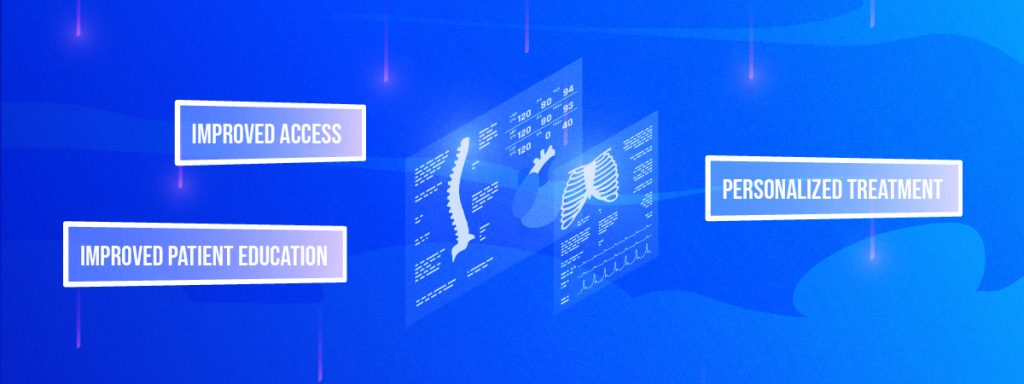The metaverse is a digital reality that combines technologies like augmented reality (AR), virtual reality (VR), and blockchain to enable users to interact, collaborate, and earn virtually. AR overlays virtual elements and sounds in the real world to improve the user experience. VR is entirely a virtual world, its users interact with various digital objects in this computer-generated environment.
Digital objects blend seamlessly into the real world in AR and are perceived as natural elements of an environment. Some common AR use cases include education, entertainment, audits, and training. AR has found application in healthcare as well, as medical professionals can practice complex procedures without using expensive resources. VR has the potential to revolutionize many industries, such as the entertainment and gaming sectors, by enabling users to engage in simulated environments. It is also growing in the education sector, with applications such as military or medical training. You can use a VR headset to access the metaverse, which historically needed to be connected to a device. The latest headsets come as stand-alone or wireless units, and some popular VR headsets include Meta Quest, Oculus Quest, and Playstation VR. The metaverse using these technologies can disrupt many traditional industries, including healthcare. This article will explore the role of the metaverse in healthcare, virtual healthcare experiences, its benefits, and case studies.
The Role of the Metaverse in Healthcare
Metaverse technologies are evolving and becoming more accessible. Many industries, including healthcare, have started realizing its benefits. Metaverse has the potential to unlock multiple medical use cases and revolutionize the healthcare sector. Its technologies, such as 360-degree video, haptics, and 3D visuals, enable cost-effective staff training and upskilling with high efficiencies on a large scale.
Gamification and simulations are powerful tools for medical professionals to create real-life experiences. Healthcare institutes can train professionals on therapeutics and how to use complex medical equipment. For example, leading medical institutions can provide training to students in a virtual operating room with various instruments. Healthcare institutions, especially rural ones, have a shortage of medical professionals. The metaverse, through telehealth, can provide remote services such as diagnosis, treatment, and monitoring using AR/VR headsets and other wearable devices.
Read more: Future of Virtual Events in the Metaverse
Virtual Healthcare Experiences
Virtual healthcare uses various tools, such as telehealth and telemedicine, to deliver affordable medical services, education, and training to remote areas over long distances. There are numerous virtual healthcare experiences; some vital ones are below.
- Virtual Hospitals
Healthcare institutions can build virtual hospitals for access to more geographic areas, shorter wait times, cheaper costs, and more. Cutting-edge technologies such as AR/VR, IoT, the cloud, and the metaverse are quickly evolving virtual hospitals. Doctors can reduce their in-person visits as they can monitor their patient’s health remotely using metaverse technologies.
- Digital Therapeutics
Digital therapeutics can create many metaverse healthcare applications and are quickly expanding. AR and VR technology can unlock multiple medical use cases, such as support groups, cognitive therapy, rehabilitation, and physical therapy. The pandemic has expedited the development of digital therapeutics as it combines the physical and digital worlds to deliver cutting-edge solutions.
Read more: Metaverse vs Virtual Reality
Advantages and Impact of the Metaverse in Healthcare

Improved access
The metaverse can overcome physical and logistical barriers to providing medical services. For example, disabled patients or patients staying in remote locations can consult doctors from their homes using metaverse technology.
Improved patient education
VR devices can improve patient education and enable a better understanding of complex procedures. For example, the CardioSmart Heart app allows users to explore various parts of the heart in 3D to understand their condition better.
Personalized treatment
The metaverse can make treatment plans more personalized through AI-powered predictive analytics. Healthcare professionals can integrate real-time data for precise and tailored treatment.
Technological Innovations in Healthcare and the Metaverse
The metaverse is responsible for various technological innovations, such as wearable healthcare technology. These are monitoring devices worn on the body to monitor medical data using biosensors. These devices can accurately monitor pulse, blood pressure, sleep, and other health data. The metaverse employs blockchain technology to provide a secure platform for medical data storage and sharing. It ensures the integrity and security of sensitive patient data. Safe medical data-sharing practices can improve collaboration among medical professionals, leading to better results. Artificial intelligence (AI) tools can help make more precise diagnoses and predict how patients react to a particular treatment. These tools can improve treatment plans, improve diagnosis accuracy, and reduce errors.
Ethical and Legal Considerations in Metaverse Healthcare
The metaverse offers many potential use cases in the healthcare sector, but there are a few challenges that need to be addressed. Some metaverse challenges in healthcare include:
- Privacy and security: One of the significant challenges in protecting patient privacy and securing health data. Additionally, virtual interactions and data transfers need to be secure and comply with current regulations
- Ethical Considerations: The emergence of new technologies brings ethical challenges. They need to be addressed for a broader adoption of this technology. For example, how will patient data be used in the metaverse? The success of healthcare in the metaverse will depend on whether this new technology develops and deploys ethically.
Case Study: Successful Applications of the Metaverse in Healthcare
We have seen many successful applications of metaverse technology in the medical field. The metaverse can provide an environment for virtual rehabilitation and physical therapy. This feature can reduce in-person visits and improve health results. For example, Oxford Medical Simulation is a healthcare company that uses the metaverse to simulate medical emergencies to improve training. Medical simulations can be performed in the metaverse to enable healthcare professionals to practice their skills in a realistic and safe environment. This company has been successful in improving medical training and education.
The Future of Healthcare in the Metaverse
We are witnessing many innovations in the healthcare sector due to the continuous evolution of metaverse technologies. One such innovation is IoT devices, which offer medical professionals new ways to monitor their patients’ health. We have seen a variety of wearable IoT devices emerge, and they provide an array of health benefits. They can automatically collect health metrics like blood pressure, temperature, and heart rate from patients not physically present in a hospital. It eliminates the need for patients to travel to receive healthcare services.
The metaverse also provides a platform for medical research, allowing researchers to collaborate in a virtual environment. It also gives them access to large data sets for medical analysis. This process can accelerate medical research, leading to new cures and treatments. Various metaverse technologies offer significant solutions in the healthcare sector, but it remains to be seen if these will be cost-effective and, more importantly, if they comply with existing regulations. The metaverse also needs to keep working on improving the privacy, security, and accuracy of its healthcare technology solutions to ensure the best experience for all stakeholders.
Read more: How Is Web 3.0 Transforming Healthcare
To stay up to date with the latest crypto news, visit ZebPay blogs. Click on the button below to trade on ZebPay.







